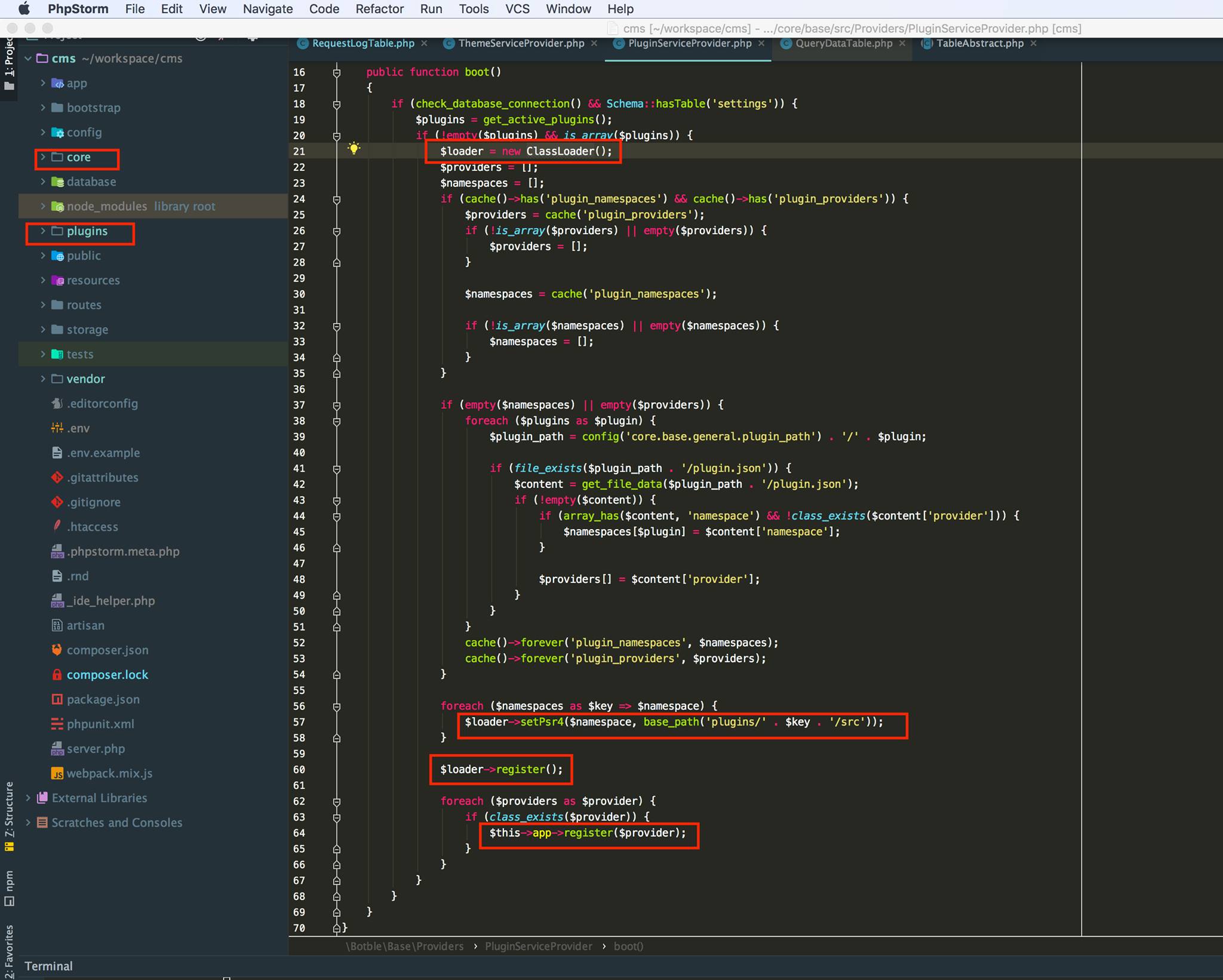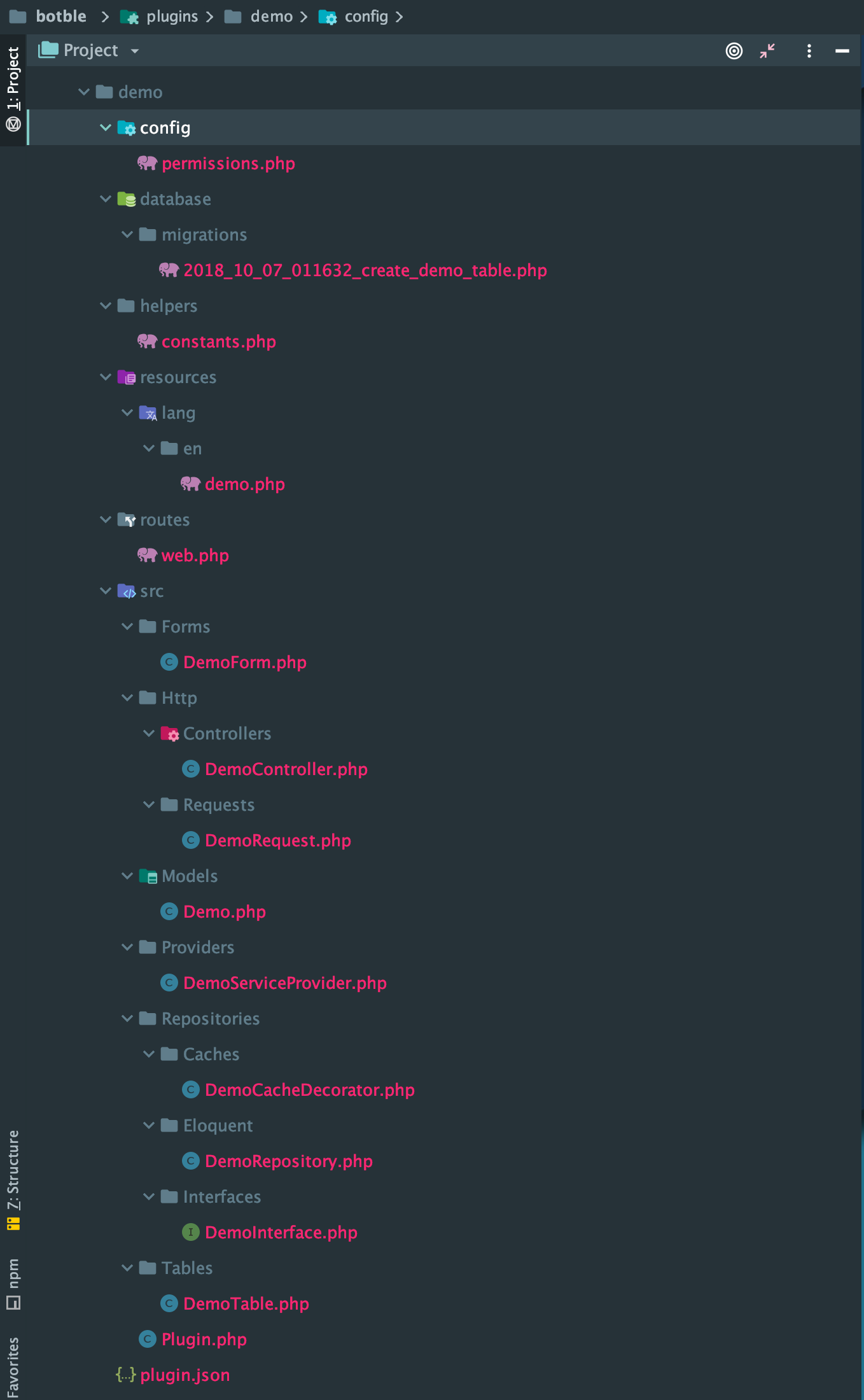Plugin Structure
All plugins are registered to Composer autoloader manually. It needs a plugin.json file to provide all needed information for auto-loading.

A basic plugin structure.

plugin.json: All information about this plugin.
Example:
php
{
"name": "Demo",
"namespace": "Botble\\Demo\\",
"provider": "Botble\\Demo\\Providers\\DemoServiceProvider",
"author": "Botble Technologies",
"url": "https://botble.com",
"version": "1.0",
"description": "The description for plugin demo"
}src/Plugin.php: Using to handleactivate,deactivate,removeevents for plugin.
Example:
php
namespace Botble\Demo;
use Schema;
use Botble\Base\Interfaces\PluginInterface;
class Plugin implements PluginInterface
{
public static function activate()
{
}
public static function deactivate()
{
}
public static function remove()
{
Schema::dropIfExists('demos'); // Remove table demo when removing plugin "demo"
}
}config/permissions.php: Each plugin should have a configuration for permission. Permissions are codebase so we need to define it in this file.
Example:
php
return [
[
'name' => 'Demo',
'flag' => 'demo.list',
],
[
'name' => 'Create',
'flag' => 'demo.create',
'parent_flag' => 'demo.list',
],
[
'name' => 'Edit',
'flag' => 'demo.edit',
'parent_flag' => 'demo.list',
],
[
'name' => 'Delete',
'flag' => 'demo.delete',
'parent_flag' => 'demo.list',
],
];database/migrations/2018_10_07_011632_create_demo_table.php: After generating a plugin, it'll create a first migration, you should modify it before activating a plugin. When activating a plugin, its migrations will run automatically.
Example:
php
use Illuminate\Database\Migrations\Migration;
use Illuminate\Database\Schema\Blueprint;
return new class () extends Migration {
public function up(): void
{
Schema::create('demos', function (Blueprint $table) {
$table->id();
$table->string('name', 120);
$table->tinyInteger('status')->unsigned()->default(1);
$table->timestamps();
$table->engine = 'InnoDB';
});
}
public function down(): void
{
Schema::dropIfExists('demos');
}
};helpers/constants.php: to define all PHP constants for this plugin. It must have a constant for its screen name.
Example:
php
if (!defined('DEMO_MODULE_SCREEN_NAME')) {
define('DEMO_MODULE_SCREEN_NAME', 'demo');
}resources/lang/en/demo.php: language for your plugin. If you need to translate to more languages, let add new translation file. Ex:resources/lang/vi/demo.php
Example:
php
return [
'name' => 'Demo',
'create' => 'New demo',
'edit' => 'Edit demo',
];routes/web.php: Routes for this plugin. You can createroutes\api.phpif you need to work on API.
Example:
php
<?php
Route::group(['namespace' => 'Botble\Demo\Http\Controllers', 'middleware' => ['web', 'core']], function () {
Route::group(['prefix' => BaseHelper::getAdminPrefix(), 'middleware' => 'auth'], function () {
Route::group(['prefix' => 'demos', 'as' => 'demo.'], function () {
Route::resource('', 'DemoController')->parameters(['' => 'demo']);
Route::delete('items/destroy', [
'as' => 'deletes',
'uses' => 'DemoController@deletes',
'permission' => 'demo.destroy',
]);
});
});
});src/Forms/DemoForm.php: Create and update form.src/Http/Controllers/DemoController.php: Controller, you can create many controllers as you want.src/Http/Requests/DemoRequest.php: Request to validate submit form.src/Models/Demo.php.src/Providers/DemoServiceProvider.php: This is the main file of a plugin. A plugin must have this file.
Example:
php
public function register()
{
// Binding repositories if cache is disabled.
$this->app->singleton(DemoInterface::class, function () {
return new DemoRepository(new Demo());
});
Helper::autoload(__DIR__ . '/../../helpers'); // Load all constants/helpers from helpers folder.
}
public function boot()
{
$this
->setNamespace('plugins/demo') // Set namespace of a plugin, it's used for views/lang. Example: view('plugins.demo::create'), trans('plugins.demo::demo.create')
->loadAndPublishConfigurations(['permissions']) // Load configuration from config folder.
->loadAndPublishViews()
->loadAndPublishTranslations()
->loadRoutes(); // Load route. It's equal ->loadRoutes(['web']), if you need to work on API, you can add "api" to load it.
// Register plugin menu to admin menu
Event::listen(RouteMatched::class, function () {
dashboard_menu()->registerItem([
'id' => 'cms-plugins-demo', // Id of menu. It must be unique
'priority' => 5, // Position of plugin
'parent_id' => null, // Parent ID, if it's not null, this menu will be submenu
'name' => trans('plugins.demo::demo.name'),
'icon' => 'fa fa-list',
'url' => route('demo.list'),
'permissions' => ['demo.list'], // Permission key, it's defined in /config/permissions.php
]);
});
}src/Repositories: Define all needed repositories for plugin models.src/Tables/DemoTable.php: Using in listing page.
